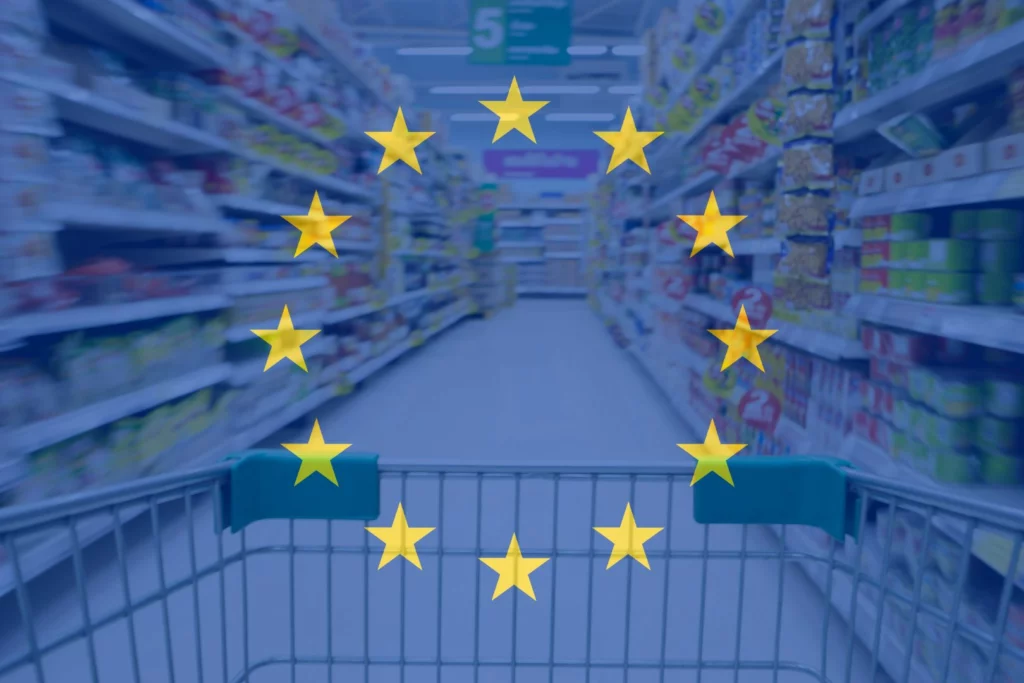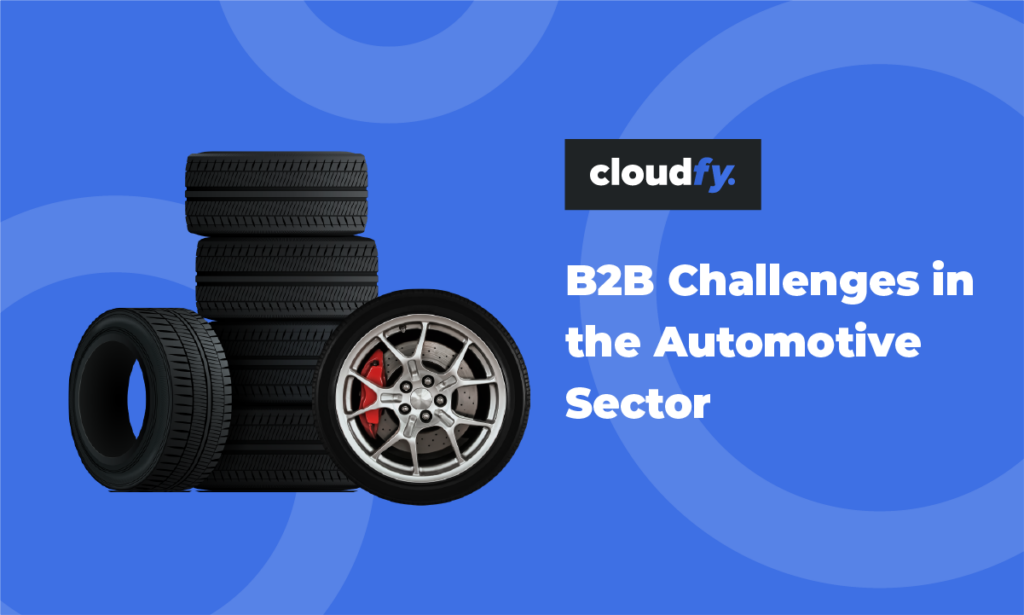The move toward digital-first operations in B2B commerce isn’t just about better customer experience, it’s also being driven by compliance. One of the biggest changes on the horizon for FMCG wholesalers and distributors selling into the EU is the introduction of EN16931, the European standard for electronic invoicing.
EN16931 sets out a common structure and format for eInvoices across all EU member states. The goal? To make B2B transactions more streamlined, transparent, and interoperable across borders, particularly for companies involved in public procurement. But its influence is extending rapidly across private sector B2B trade, especially in sectors like FMCG, where high invoice volumes, repeat transactions, and fast-moving goods are the norm.
For EU-based FMCG businesses, this means preparing now for a shift to fully digital invoicing processes. For UK-based businesses that trade with the EU, it’s equally important, because if you’re selling into EU countries, you’ll likely be required to comply with EN16931 or a localised version of it.
At Cloudfy, we work closely with FMCG wholesalers and distributors across Europe and the UK to help them futureproof their operations, and that includes preparing for standards like EN16931 through smart, integrated B2B ecommerce and invoicing solutions.
Why FMCG Businesses Should Pay Attention
For FMCG wholesalers and distributors, invoicing is rarely a one-off task. You are dealing with frequent repeat orders, large customer bases, and fast product turnover, which means high volumes of invoices going in and out every day. Moving to structured electronic invoicing is not just about ticking a compliance box. It is about improving accuracy, speeding up processing, and reducing admin headaches.
By aligning with EN16931, FMCG businesses can improve cash flow, reduce errors, and create a more professional buying experience for their trade customers. And with many EU countries now setting firm deadlines for eInvoicing adoption, the clock is ticking particularly if you are selling across borders.
Important eInvoicing Deadlines: What You Need to Know
Across the EU, governments are moving fast to mandate eInvoicing and deadlines are either already here or fast approaching.
Here are a few key examples:
France: B2B eInvoicing becomes mandatory from September 2026, starting with larger businesses. Smaller companies will follow shortly after.
Italy: Already enforces eInvoicing for most domestic B2B transactions.
Germany: From January 2025, structured eInvoices will be required for domestic B2B transactions, with wider adoption expected soon after.
Poland: Plans to make eInvoicing mandatory in early 2026 following a slight delay.
(Sources; eInvoicing Country Factsheets for each Member State and other countries)
These changes are all built around the EN16931 European standard, which ensures structured invoice data can be processed automatically across different platforms and government systems. If your FMCG business trades in or with these countries, you’ll need to be compliant, no exceptions. (Sources: EN 16931 compliance, Obtaining a copy of the European standard on eInvoicing)
What If You’re a UK Business?
If you only sell within the UK and have no EU customers or suppliers, you’re not currently required to follow these rules. But that’s not the end of the story.
If you sell into the EU, or work with EU-based partners even occasionally you’ll likely need to comply with local eInvoicing regulations for those transactions. That means understanding each market’s specific deadline and technical requirements.
For UK FMCG wholesalers and distributors with international ambitions, the safest approach is to future-proof now. Starting to adopt compliant eInvoicing formats will reduce friction, avoid penalties, and strengthen your cross-border relationships.
Steps to Achieve EN16931 eInvoicing Compliance
Understand the Standard
EN16931 defines a common structure for electronic invoices, ensuring consistency across EU member states. It specifies the core elements an eInvoice must contain, such as invoice number, dates, amounts, tax details, and supplier and buyer information. Familiarising yourself with these requirements is the first step towards compliance.
Assess Your Current Invoicing Processes
Review your existing invoicing systems to determine if they can produce and process invoices in the EN16931-compliant formats, primarily UBL (Universal Business Language) or UN/CEFACT CII (Cross Industry Invoice). Identify any gaps that need addressing, such as missing data fields or incompatible formats.
Choose the Right Technology Partner
Select an eInvoicing solution or platform that supports EN16931 compliance. The chosen system should be capable of generating, sending, receiving, and storing invoices in the required formats. Ensure it integrates seamlessly with your existing ERP or accounting systems.
Implement Necessary System Updates
Work with your IT team or service provider to configure your systems according to EN16931 specifications. This may involve updating invoice templates, setting up validation checks, and ensuring the correct use of codes and identifiers.
Train Your Staff
Educate your finance and administrative teams about the new invoicing processes. Provide training on how to create, send, and process EN16931-compliant invoices to ensure smooth adoption
Test and Validate
Before going live, conduct thorough testing to ensure your eInvoices meet EN16931 standards. Use validation tools to check for compliance and rectify any issues identified during testing.
Monitor and Maintain Compliance
Stay updated with any changes to the EN16931 standard or national specifications (CIUS) that may affect your invoicing processes. Regularly review and update your systems to maintain compliance.
By following these steps, FMCG B2B businesses can ensure they are prepared for the shift towards electronic invoicing, facilitating smoother transactions and compliance with EU regulations. (Sources EN 16931 compliance, Obtaining a copy of the European standard on eInvoicing)
Adopting EN16931, especially for FMCG B2B businesses, isn’t always a plug-and-play process. While the long-term goal is greater efficiency and cross-border standardisation, there are some real-world challenges companies may encounter:
System Integration Complexity
Many businesses still use legacy ERP systems, or have multiple systems that don’t ‘speak the same language.’ Integrating eInvoicing standards like EN16931 often requires significant work to ensure that invoices can be generated, sent, and received in the correct format (typically PEPPOL BIS or other XML-based structures).
Cloudfy Insight: Cloudfy’s API-first architecture and ERP integration capabilities can make this smoother and bridge the gap providing a modern integration platform. Businesses still need to evaluate how ready their back-office systems are.
Lack of Internal Expertise
EN16931 isn’t just a simple template it’s a detailed semantic data model. Understanding what’s required in terms of mandatory fields, format, validation rules and legal requirements can be a steep learning curve for internal teams, especially if they’ve never worked with structured invoice data before.
Varying Deadlines and Rules by Country
The EU has a fragmented rollout, with different countries introducing mandates on different timelines and under different conditions (B2G, B2B, B2C). UK-based companies may not feel the pressure unless they trade with EU-based partners but for those that do, it’s not a one-size-fits-all rulebook.
Example: Italy mandates B2B eInvoicing for domestic transactions. France and Germany are in various stages of rolling out their requirements.
Cost of Implementation
Depending on the business size and complexity, achieving compliance may involve investing in middleware, hiring consultants, or subscribing to third-party invoicing solutions (like PEPPOL access points). For smaller or medium-sized FMCG distributors, this can be a barrier.
Change Management and Training
Even when the technical side is sorted, businesses need to ensure that staff understand the new workflows. Whether it’s sales teams generating compliant invoices or finance teams validating incoming ones, clear training and documentation are essential.
How Cloudfy Helps FMCG B2B Businesses Get Ready for EN16931
At Cloudfy, we understand that compliance isn’t just about ticking boxes it’s about making life easier for your teams while meeting regulatory demands. That’s why we’re already working with B2B wholesalers and distributors across the FMCG space to prepare for the shift to structured eInvoicing.
Here’s how we help simplify the journey:
Built-in Support for Structured Invoice Formats
Cloudfy’s flexible architecture allows for the creation and export of invoices in structured formats, including those compliant with EN16931. This means you can generate invoices that meet EU regulatory standards without reinventing your back office.
Seamless ERP Integration
Many of our clients already use Cloudfy alongside systems like SAP, Microsoft Dynamics, and NetSuite. We can pass compliant invoice data straight from your ERP through to the Cloudfy platform ensuring accuracy and saving time.
API-Ready for eInvoicing Gateways
If you’re using (or need to use) third-party eInvoicing gateways, Cloudfy can integrate easily via API. This allows invoices to flow from your platform into the appropriate national or cross-border systems, without manual intervention.
Support for UK and EU Trading Needs
Whether you’re a UK-based FMCG distributor selling into the EU or an EU business preparing for national eInvoicing mandates we can tailor our support to fit your compliance landscape. If you don’t currently sell into Europe, we can help you future-proof for when you do.
Guidance, Not Just Technology
Because we work so closely with B2B businesses, our team has seen a wide range of invoicing setups the good, the bad and the messy. We’ll help you cut through the complexity, figure out what’s essential, and implement a solution that fits your specific business model.
Compliance should never come at the cost of simplicity. Our goal is to make eInvoicing feel like just another streamlined part of doing business online.
Rob Williams, CEO at Cloudfy
Food for Thought: The Real-World Impact of eInvoicing in Numbers
Additional Interesting Stats on the Impact of eInvoicing in B2B
Increased Processing Speed. eInvoices can be processed up to 5 times faster than traditional paper or PDF invoices. (Source: Billentis eInvoicing Report)
Administrative Time Savings. Businesses can reduce invoice processing time from an average of 8–10 days to less than 3 days using structured eInvoicing.
Adoption Incentives. Some EU countries (e.g., Italy, France) now make eInvoicing mandatory for B2B and B2G transactions, pushing adoption rates to over 90% in certain sectors. (Source: European Commission, Peppol)
Reduction in Fraud. Structured eInvoices help reduce invoice fraud by up to 80%, thanks to improved data validation and audit trails. (Source: EY/European Commission study)
Market Size Impact. The global eInvoicing market is expected to reach $24 billion by 2027, with Europe leading growth due to regulation. (Source: Fortune Business Insights, 2023)
Sustainability Benefit. For every 1,000 eInvoices sent instead of paper invoices, a business can save up to 250kg of CO₂, 13 trees, and 30,000 litres of water. (Source: Tungsten Network Sustainability Report)





